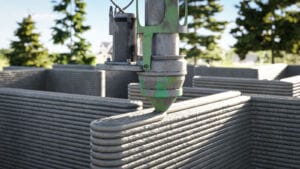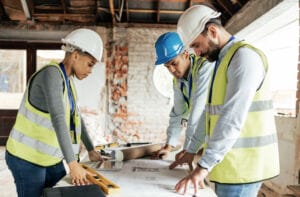With concerns about COVID-19 still lingering in the Phoenix metropolitan area, many workplaces have yet to welcome their employees back to the office. How productive employees are while working remotely is a mixed bag. Some love it, some hate it, and most are just trying to make the most of a bad situation and have adjusted to the current reality.
AZRE Magazine reached out to some NAIOP Arizona members to ask them how they are handling not being in their fully-staffed offices, what they miss about the office environment, and how they feel this current trend of remote working will affect future office policy.
Read more: Here’s how pandemic’s impact on office market is coming into focus
AZRE magazine posed questions on the topic to Linda Bruce (LB), vice president and commercial account manager at Fidelity National Title; Jamie Godwin (JG), president and CEO of Stevens-Leinweber Construction, Inc.; and Nick Shepherd (NS), vice president of commercial real estate banking for Bankers Trust.
AZRE: How much have you personally missed the office environment and why?

NS: While I have enjoyed the casualness that comes with working from home, I definitely miss the community aspect of our office. The camaraderie between my co-workers and the “pop-up” conversations that can occur when a question or thought comes to mind is difficult to achieve over the phone or a zoom call. My personality leans more towards the extrovert side, so I tend to draw energy from being around others – those are the pieces I miss most about the office environment.
LB: Since our company is a qualified ‘essential business, our offices have remained open with Branch Managers and our Leadership at the helm and many employees working from home. From my own experience, I have been an ‘in-market’ employee for over 20 years and although it isn’t for everyone, once I learned the art of falling in to the ‘working from home’ groove, I prefer it. I’m less distracted when focusing on a project and since I’m on the Business Development side of our business, prior to Covid, I was in the field much of the time so was able to get my ‘people fix’. I have missed the office environment and the opportunity to connect with people since there is no substitute for one-on-one face time together.
JG: The way our space is set up, I am fortunate to have been able to continue to work from my Stevens-Leinweber office during the pandemic. We’ve implemented staggered schedules and work-from-home models at various times, and we currently have a mask policy for those physically in the office. I believe having me present throughout has provided consistency, supported job stability and created a pivot point for collaboration – even if we’re collaborating in different ways right now to ensure everyone’s safety.

AZRE: What are some of the biggest benefits of working in the office as opposed to working from home?
JG: Offices give you the built-in efficiencies of a central administrative hub and the ability to separate yourself from the distractions of home. They also provide a venue for spontaneous, day-to-day interactions between team members that wouldn’t happen any other way. These exchanges can help strengthen working relationships and often involve sharing beneficial information that may not have had the opportunity to be discussed otherwise. In these ways, a real time, face-to-face environment contributes significantly to the culture of a firm, making it easier for team members to feel engaged and a part of something bigger than themselves.
NS: Being around people, sharing ideas, working through questions or problems as they come up and a change of scenery are all things I believe the office environment can provide that working from home cannot.
LB: From my position, communication, innovation and connection. I am very team oriented so working on a project and communicate with our departments and utilize our resources allows me to continue to focus on the overall success of that project and most importantly our clients. Communication has been the key to our success as a company navigating our way through this season. Our team became innovative very quickly and implemented daily calls, video first meetings internally through learning how to master Teams and Zoom which helped us stay connected in a virtual world. Connecting with those we work with is essential and technology has been a huge benefit during this time. We may connect differently in our future with safe distancing, masks and additional protocol however, Zoom Calls, Teams and emails will never replace the true connection with people.

AZRE: We hear a lot about more people working from home permanently, but do you see that trend continuing long term?
LB: What I’ve heard from clients and associates is that there is a trend for smaller businesses moving to the working from home environment, however, with the larger offices that have larger space and more people in that space, many are returning to the office environment with space changes; increased space between bullpen offices, kitchen areas, etc. Since we are moving to a different norm for space overall, I have heard that home offices have also become a great place for innovation and the launch of new business and entrepreneurial opportunities. I also think that many are looking for ways to save on costs so working from home is another great way to make that happen.
JG: I expect that this will be a permanent change for some businesses and employees. The forced work-from-home experiment was something that many firms may have never attempted otherwise. Those that have now experienced it, and found that it works for them, may elect to continue. That said, I don’t believe it will result in a large-scale elimination of the physical office environment. There are too many businesses that have program requirements that just don’t translate to that structure.
Our company, as an example, thrives on a level of collaboration and coordination that – long term – needs a physical office to prosper. Other companies might struggle with this same challenge, or have more specific challenges like legal or security requirements, or similar restrictions.
NS: It’s hard not to see that, at least to some degree. From the employee perspective, I think that most of us enjoy being around others so I feel there will be a draw to get back to the workplace eventually. To the contrary however, working remotely provides the flexibility most of us covet to achieve that “work-life balance”, especially when juggling multiple commitments and family obligations. From the employer’s perspective, it feels like most folks in management are getting over the old-fashioned perception that their team needs to be in plain site to be held accountable. Ultimately, it will require serious consideration from the decision makers of how much space is really needed before signing up another 5-10 years at $35-$40 PSF and my best guess is there will be something in the middle (less space, more reservation system of workspace or assigned days in the office/home).
AZRE: Do you feel companies will demand more or less office space in the future?
NS: As a commercial real estate Lender, the office industry is one that has intrigued me the most since the start of the pandemic. Being forced to work from home has given everyone adequate time to find their groove and best efficiencies. Even with the idea of “more office space is needed to properly distance”, it’s hard for me to think demand will increase in the next 2-3 years. When weighing both the employee morale that comes with the flexibility from teleworking and also the uncertainty that exists around the virus and economy, companies will be forced to consider alternative work space as well as the savings to the bottom line as leases renew in the midst of the coronavirus era.
JG: I wish I knew the answer to that question. I could make some bets on real estate! I actually think we are still months away from having any sense of what the result of COVID will be long term. Projections tell us that some firms will shrink their office footprint due to economic impact or trouble transitioning to remote work scenarios. On the other hand, we are seeing some companies expand to accommodate new market demands and shifting their office build-outs to account for social distancing. That gives me hope for at least a net-neutral impact on office square footage near term while we build back to a higher level of growth long term.
LB: This is the current debate and depending on who you discuss this with depends on the answer. I believe office space is important for many companies and that not everyone excels, is inspired, motivated and happy in a home office environment. I believe office space will boost new design, space, distancing and innovation and it will be interesting to see if the demand is more or less in our future.




